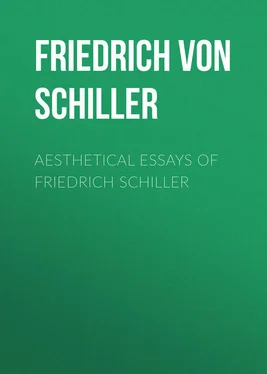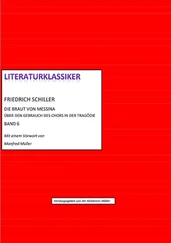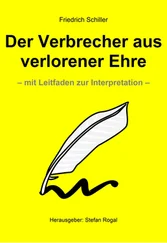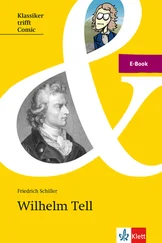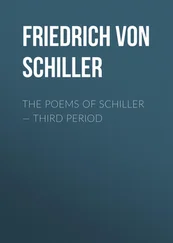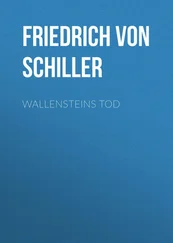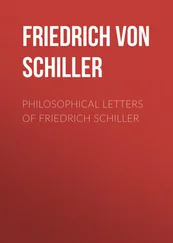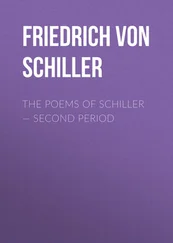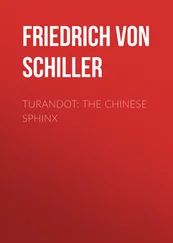Friedrich Schiller - Aesthetical Essays of Friedrich Schiller
Здесь есть возможность читать онлайн «Friedrich Schiller - Aesthetical Essays of Friedrich Schiller» — ознакомительный отрывок электронной книги совершенно бесплатно, а после прочтения отрывка купить полную версию. В некоторых случаях можно слушать аудио, скачать через торрент в формате fb2 и присутствует краткое содержание. Жанр: literature_18, foreign_antique, foreign_prose, на английском языке. Описание произведения, (предисловие) а так же отзывы посетителей доступны на портале библиотеки ЛибКат.
- Название:Aesthetical Essays of Friedrich Schiller
- Автор:
- Жанр:
- Год:неизвестен
- ISBN:нет данных
- Рейтинг книги:3 / 5. Голосов: 1
-
Избранное:Добавить в избранное
- Отзывы:
-
Ваша оценка:
- 60
- 1
- 2
- 3
- 4
- 5
Aesthetical Essays of Friedrich Schiller: краткое содержание, описание и аннотация
Предлагаем к чтению аннотацию, описание, краткое содержание или предисловие (зависит от того, что написал сам автор книги «Aesthetical Essays of Friedrich Schiller»). Если вы не нашли необходимую информацию о книге — напишите в комментариях, мы постараемся отыскать её.
Aesthetical Essays of Friedrich Schiller — читать онлайн ознакомительный отрывок
Ниже представлен текст книги, разбитый по страницам. Система сохранения места последней прочитанной страницы, позволяет с удобством читать онлайн бесплатно книгу «Aesthetical Essays of Friedrich Schiller», без необходимости каждый раз заново искать на чём Вы остановились. Поставьте закладку, и сможете в любой момент перейти на страницу, на которой закончили чтение.
Интервал:
Закладка:
If all the epochs of literature are considered as a whole it will be seen that they succeed each other in a constant order. After the period when the idea and the form combined in a harmonious manner comes another where the social idea is superabundant, and destroys the literary form of the preceding epoch.
The middle ages introduced spiritualism in art; before this new idea the smiling untruths of Greek poetry fled away frightened. The classical form so beautiful, so pure, cannot contain high Catholic thought. A new art is formed; on this side the Alps it does not reach the maturity that produces masterpieces. But at that time all Europe was one fatherland; Italy completes what is lacking in France and elsewhere.
The renaissance introduces new ideas into civilization; it resuscitates the traditions of antique science and seeks to unite them to the truths of Christianity. The art of the middle ages, as a vessel of too limited capacity, is broken by the new flood poured into it. These different ideas are stirred up and in conflict in the sixteenth century; they became co-ordinate and attain to an admirable expression in the following age.
In the eighteenth century there is a new invasion of ideas; all is examined and questioned; religion, government, society, all becomes a matter of discussion for the school called philosophical. Poetry appeared dying out, history drying up, till a truer spirit was breathed into the literary atmosphere by the criticism of Lessing, the philosophy of Kant, and the poetry of Klopstock. It was at this transition period that Schiller appeared, retaining throughout his literary career much of the revolutionary and convulsive spirit of his early days, and faithfully reflecting much of the dominant German philosophy of his time.
Part of the nineteenth century seems to take in hand the task of
reconstructing the moral edifice and of giving back to thought a larger form. The literary result of its effects is the renaissance of lyrical poetry with an admirable development in history.
Schiller's most brilliant works were in the former walk, his histories have inferior merit, and his philosophical writings bespeak a deep thinking nature with great originality of conception, such as naturally results from a combination of high poetic inspiration with much intellectual power.
Schiller, like all great men of genius, was a representative man of his country and of his age. A German, a Protestant free-thinker, a worshipper of the classical, he was the expression of these aspects of national and general thought.
The religious reformation was the work of the North. The instinct of races came in it to complicate the questions of dogmas. The awakening of individual nationalities was one of the characters of the epoch.
The nations compressed in the severe unity of the Middle Ages escaped in the Reformation from the uniform mould that had long enveloped them, and tended to that other unity, still very distant, which must spring from the spontaneous view of the same truth by all men, result from the free and original development of each nation, and, as in a vast concert, unite harmonious dissonances. Europe, without being conscious of its aim, seized greedily at the means – insurrection; the only thought was to overthrow, without yet thinking of a reconstruction. The sixteenth century was the vanguard of the eighteenth. At all times the North had fretted under the antipathetic yoke of the South. Under the Romans, Germany, though frequently conquered, had never been subdued. She had invaded the Empire and determined its fall. In the Middle Ages the struggle had continued; not only instincts, but ideas, were in conflict; force and spirit, violence and polity, feudalism and the Catholic hierarchy, hereditary and elective forms, represented the opposition of two races. In the sixteenth century the schism long anticipated took place. The Catholic dogma had hitherto triumphed over all outbreaks – over Arnaldo of Brescia, the Waldenses, and Wickliffe. But Luther appeared, and the work was accomplished: Catholic unity was broken.
And this breaking with authority went on fermenting in the nations till its last great outburst at the French Revolution; and Schiller was born at this convulsive period, and bears strong traces of his parentage in his anti-dogmatic spirit.
Yet there is another side to Germanism which is prone to the ideal and the mystical, and bears still the trace of those lovely legends of mediaeval growth to which we have adverted. For Christianity was not a foreign and antagonistic importation in Germany; rather, the German character obtained its completeness through Christianity. The German found himself again in the Church of Christ, only raised, transfigured, and sanctified. The apostolic representation of the Church as the bride of Christ has found its fullest and truest correspondence in that of Germany. Hence when the German spirit was thoroughly espoused to the Christian spirit, we find that character of love, tenderness, and depth so characteristic of the early classics of German poetry, and reappearing in glorious afterglow in the second classics, in Klopstock, Herder, and, above all, Schiller.
It is this special instinct for the ideal and mystical in German nature that has enabled spirits born of negation and revolution, like Schiller, to unite with those elements the most genial and creative inspirations of poetry.
VOCABULARY OF TERMINOLOGY
Absolute, The. A conception, or, more strictly, in Kantian language, an idea of the pure reason, embracing the fundamental and necessary yet free ground of all things.
Antinomy. The conflict of the laws of pure reason; as in the question of free will and necessity.
Autonomy (autonomous). Governing itself by the spontaneous action of free will.
Aesthetics. The science of beauty; as ethics of duty.
Cognition (knowledge; Germanice, "Erkenntniss") is either an intuition or a conception. The former has an immediate relation to the object, and is singular and individual; the latter has but a mediate relation, by means of a characteristic mark, which may be common to several things.
Cognition is an objective perception.
Conception. A conception is either empirical or pure. A pure conception, in so far as it has its origin in the understanding alone, and is not the conception of a pure sensuous image, is called notio.
Conceptions are distinguished on the one hand from sensation and perception, and on the other hand from the intuitions of pure reason or ideas. They are distinctly the product of thought and of the understanding, except when quite free from empirical elements.
Feeling (Gefuehl). That part of our nature which relates to passion and instinct. Feelings are connected both with our sensuous nature, our imagination, and the pure reason.
Form. See Matter.
Ideas. The product of the pure reason (Vernunft) or intuitive faculty. Wherever the absolute is introduced in thought we have ideas. Perfection in all its aspects is an idea, virtue and wisdom in their perfect purity and ideas. Kant remarks ("Critique of Pure Reason," Meiklejohn's translation, p. 256): "It is from the understanding alone that pure and transcendental conceptions take their origin; the reason does not properly give birth to any conception, but only frees the conception of the understanding from the unavoidable limitation of possible experience. A conception formed from notions which transcend the possibility of experience is an idea or a conception of reason."
Intuition (Anschauung) as used by Kant, is external or internal. External, sensuous intuition is identical with perception; internal intuition gives birth to ideas.
Matter and Form. "These two conceptions are at the foundation of all other reflection, being inseparably connected with every mode of exercising the understanding. By the former is implied that which can be determined in general; the second implies its determination, both in a transcendental sense, abstraction being made of any difference in that which is given, and of the mode in which it is determined. That which in the phenomenon corresponds to the sensation, I term its matter; but that which effects that the content of the phenomenon can be arranged under certain relations, I call its form." – Kant, "Critique," op. cit.
Читать дальшеИнтервал:
Закладка:
Похожие книги на «Aesthetical Essays of Friedrich Schiller»
Представляем Вашему вниманию похожие книги на «Aesthetical Essays of Friedrich Schiller» списком для выбора. Мы отобрали схожую по названию и смыслу литературу в надежде предоставить читателям больше вариантов отыскать новые, интересные, ещё непрочитанные произведения.
Обсуждение, отзывы о книге «Aesthetical Essays of Friedrich Schiller» и просто собственные мнения читателей. Оставьте ваши комментарии, напишите, что Вы думаете о произведении, его смысле или главных героях. Укажите что конкретно понравилось, а что нет, и почему Вы так считаете.
